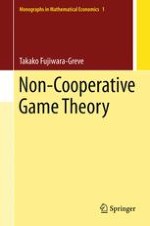2015 | OriginalPaper | Buchkapitel
6. Bayesian Nash Equilibrium
verfasst von : Takako Fujiwara-Greve
Erschienen in: Non-Cooperative Game Theory
Verlag: Springer Japan
Aktivieren Sie unsere intelligente Suche, um passende Fachinhalte oder Patente zu finden.
Wählen Sie Textabschnitte aus um mit Künstlicher Intelligenz passenden Patente zu finden. powered by
Markieren Sie Textabschnitte, um KI-gestützt weitere passende Inhalte zu finden. powered by
